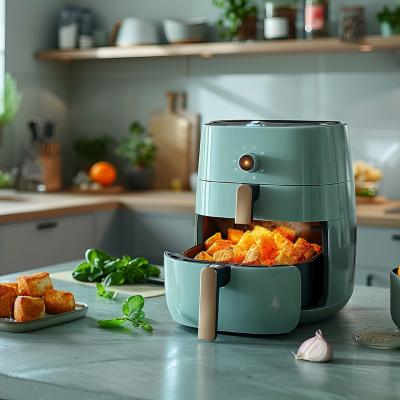
Though coconut oil is popular for its topical uses, it is also a very healthy cooking oil. Peanut oil and coconut oil are two popular oils in use today. They both have their advantages and disadvantages, so it’s best to know what they are before you start cooking!
"Peanut oil is made from groundnuts growing under the ground and coconut oil is prepared from the meat of coconut growing on trees. Both oils taste very different and have different uses."
Peanut oil tastes nutty whereas coconut oil tastes creamy. Coconut oil has saturated fats but peanut oil doesn’t.
In this article, we will compare the benefits of using peanut oil vs coconut oil in cooking and baking. We will also discuss taste, texture, and nutritional value, as well as health risks and storage tips.
Main Differences Between Coconut Oil and Peanut Oil
Peanuts grow underground, while coconuts come from trees that bear fruit on top of them. A peanut plant produces an average yield per acre of about 540 pounds, while a coconut tree can yield up to 200 coconuts per year.
Extraction
Extraction of peanut oil and coconut oil is done in different ways. Coconut oil is extracted from the meat of the coconut by pressing or cold-pressing. Peanut oil is extracted from groundnuts by a process called solvent extraction.
In this process, peanuts are mixed with a solvent (such as hexane) that dissolves the oils from the peanut kernels. The oil and solvent mixture is then separated by distillation, which removes all but about one percent of the solvent.
Coconut oil is extracted from the meat of coconut. The process starts with grating of dried coconuts and pressing them to separate out the milk (coconut cream) and pulp.
This is followed by heating the mixture at a low temperature for about 24 hours, which allows for evaporation of water content in it. The oil is then separated from the coconut milk solids through a process of centrifuge.
Taste of Peanut Oil and Coconut Oil
Peanut oil tastes nutty whereas coconut oil tastes creamy. Coconut oil has saturated fats but peanut oil doesn’t. Peanut oil is very versatile in cooking, while coconut oil can be used as a substitute for butter or shortening when making baked goods such as cookies and cakes.
Nutritional Value of Peanut Oil and Coconut Oil
Peanut oil is cholesterol-free and contains no trans fats. It is also a good source of vitamin E, which is an antioxidant that helps protect cells from damage. Coconut oil is high in saturated fat, but it also contains lauric acid, which has antimicrobial properties.
Types of Peanut Oil and Coconut Oil
There are two types of peanut oil: refined and unrefined. Refined peanut oil is made from roasted peanuts that have been ground into a paste. The paste is then heated to a high temperature, which destroys the antioxidants and creates harmful compounds called lipid peroxides.
Unrefined peanut oil is made from raw peanuts that have been cold-pressed. It has a higher smoke point than refined peanut oil and doesn’t contain the harmful compounds created during the refining process.
There are three types of coconut oil: virgin, extra-virgin, and pure. Virgin coconut oil is made from fresh coconuts that have been cold-pressed. Extra-virgin coconut oil is made from hand-picked fresh coconuts and cold-pressed to retain all of the nutrients.
Pure coconut oil is made by boiling or steaming coconut meat in water until it becomes a thick paste, then filtering out any impurities with a cloth filter.
The resulting liquid is often used as an ingredient in soaps and lotions because it has a high concentration of lauric acid, which is an antimicrobial agent that can fight off bacteria and viruses.
LEARN MORE: Peanut Oil Vs Sesame Oil
Uses of Peanut Oil Vs Coconut Oil
- Peanut oil is a good all-around cooking oil and is especially good for high-heat frying, as it has a higher smoke point than other oils.
- Coconut oil is also a good all-around cooking oil, but it is best known for its use in baking. It has a lower smoke point than peanut oil, so it is not suitable for high-heat frying.
- Peanut oil is used for frying, baking, and cooking. It can be found in most grocery stores and is often used to make peanut butter or other foods that contain peanuts.
- Peanut oil can be used for cooking as well as in salad dressings and sauces. It can also be used to make your own peanut butter at home!
LEARN MORE: Peanut Oil Vs Olive Oil
Peanut Oil Vs Coconut Oil in Cooking and Baking
Peanut oil is good for high-heat frying because it has a higher smoke point than other oils.
Coconut oil can be used as a substitute for butter or shortening when making baked goods such as cookies and cakes because it has saturated fatty acids that make the dough more pliable and easier to work with.
Coconut oil is also known for its ability to produce a moist and fluffy texture in baked goods.
Peanut oil can be used as a substitute for butter or margarine in baking recipes, although this substitution may alter the taste slightly because peanut oil has a stronger flavor than most other oils.
LEARN MORE: Peanut Oil Vs Corn Oil
Health Concerns of Peanut Oil and Coconut Oil
- Peanut oil contains a greater amount of monounsaturated fats than coconut oil. These fats are thought to be heart-healthy because they help lower your cholesterol levels.
- They also contain less saturated fat than coconut oil, which is known for its high level of saturated fatty acids (bad stuff). You can use peanut oil in cooking or baking recipes instead of coconut oil to reduce your intake of saturated fats.
- Peanut oil is cholesterol-free and contains no trans fats. It is also a good source of vitamin E, which is an antioxidant that helps protect cells from damage
- Peanut oil is relatively low in calories, compared with other oils like olive or coconut oils, which makes it a good choice if you’re on a diet.
- Coconut oil is high in saturated fat, while peanut oil is low in saturated fat. Coconut oil also contains lauric acid, which is anti-microbial and may help to protect against heart disease. Peanut oil does not contain any Lauric acid.
- Both oils are high in Omega- fatty acids. Coconut oil has a higher concentration of Omega- fatty acids than peanut oil.
LEARN MORE: Peanut Oil Vs Safflower Oil
Storage of Peanut Oil and Coconut Oil
Coconut oil is solid at room temperature, while peanut oil is liquid. This means that they have to be stored differently.
Coconut oil can be stored at room temperature, but it is best to store it in a cool, dark place. Peanut oil should be refrigerated after opening. Coconut oil will last up to two years if stored properly, while peanut oil will last for six months.
Conclusion
Peanut oil and coconut oil are both great oils with their own unique benefits. They can both be consumed in different ways for different purposes.
For example, peanut oil is a better choice for high-heat cooking because it has a higher smoke point than coconut oil. However, coconut oil is great for adding flavor to food or using topically on the skin.
Whichever type of oil you choose, make sure you are getting the most benefit out of it by consuming it in its raw form as much as possible.



